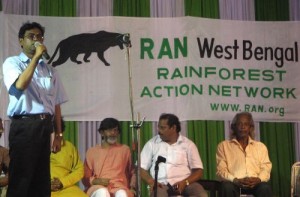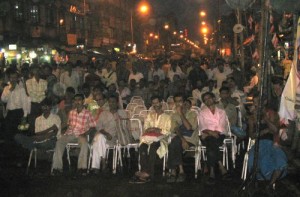Sudipta Sarkhel has been coordinating a RAN group out of West Bengal and doing some amazing work! I am pasting here a report from a public meeting they held last week where citizens from the area came to express their concern over pollution in West Bengal and its impact on the climate. It’s so amazing to me that we are now working with groups as far away as India and Nigeria. Stay tuned for more reports!
From Sudipta:
The speakers while addressing the audience expressed their grave concern over the growing environment pollution in West Bengal. They expressed disappointment and ventilated their grievances over the indifferent attitude and reluctance of the West Bengal Government to take appropriate action to prevent environmental pollution. They urged the people to be united and raise their voices in protest against the inaction of the state government in implementing the court’s order to reduce vehicles emissions. They said the state government has, however, failed to contribute in a big way in curbing pollution and phasing out old and polluting vehicles. They expressed apprehension that if global warming is not checked and the sea level continues to rise at its present rate, an area of 100 sq km covering Kolkata, Hooghly, parts of North 24 Parganas, Midnapore, Nadia, entire South 24 Parganas would be submerged in the next 50 years. They said vehicular pollution has hit photosynthesis of plants robbing the city of precious oxygen. Kolkata is extremely vulnerable to climate change impacts. For a city that often experiences intense cyclonic activity, the rising sea level is a big threat.The Sundarbans is already a victim of rising sea level. On an average, 2.5mm of the Sundarbans is sinking annually due to erosion, deforestation, and destruction of Mangrove forests. They said the city’s highly polluted air is leading to the growing number of lung cancer patients. Kolkata’s air pollution results from the horribly high level of auto emissions, which the authorities have failed to control so far. If this is not checked with a heavy hand, the impact on the health of Kolkatans, particularly children, will be devastating.
As for our future plans, our prime aim is to spread the mission and message of Rainforest Action Network among the students throughout West Bengal. Our next steps will be reaching out to the students, mobilizing and getting them involved in RAN’s activities. We have decided to hold events in schools and college campuses. At the same time we will continue our campaigning on different local issues, as we have already been requested by the local people and clubs from different parts of the state to organize meetings on local environmental issues.
With Warm Regards,
Sudipta Sarkhel

